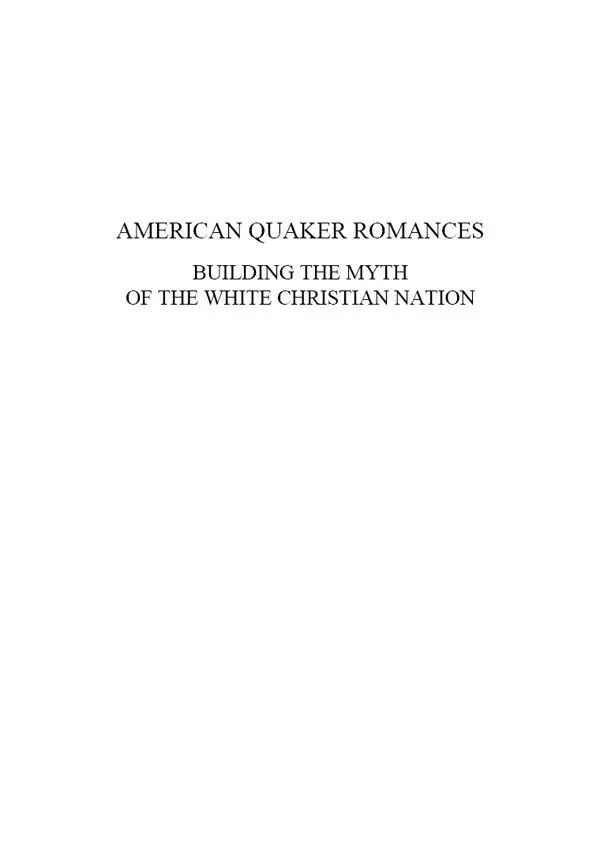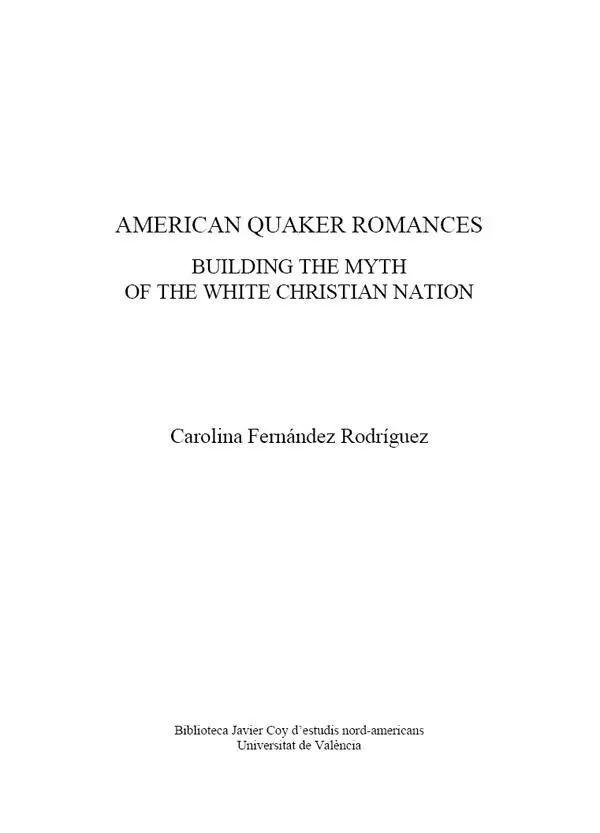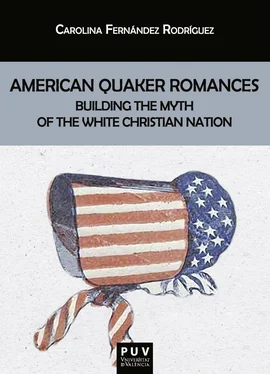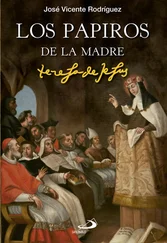
BIBLIOTECA JAVIER COY D’ESTUDIS NORD-AMERICANS
https://puv.uv.es/biblioteca-javier-coy-destudis-nord-americans.html
DIRECTORA
Carme Manuel
(Universitat de València)

American Quaker Romances:
Building the Myth of the White Christian Nation
© Carolina Fernández Rodríguez
1ª edición de 2021
Reservados todos los derechos
Prohibida su reproducción total o parcial
ISBN: 978-84-9134-908-2 (papel)
ISBN: 978-84-9134-909-9 (ePub)
ISBN: 978-84-9134-910-5 (PDF)
Imagen de la cubierta: “The New Quaker Bonnet, 1861”, cortesía de Roosevelt Civil War Envelope Collection, Booth Family Center for Special Collections, Georgetown University
Diseño de la cubierta: Celso Hernández de la Figuera
Publicacions de la Universitat de València
https://puv.uv.es
publicacions@uv.es
Edición digital
In memory of my grandmother Luisa, who knew the value of romances
[T]he use of the Other to metabolize one’s own cultural or religious anxieties may ultimately do a disservice to the represented group.
‒Weaver-Zercher (2013: 246)
The deeper realities of our faith are beyond precise verbal formulation and our way of worship based on silent waiting testifies to this.
‒The Yearly Meeting of the Religious Society
of Friends (Quakers) in Britain (2010: 3)
ACKNOWLEDGEMENTS
Research for this book was carried out in the context of the project “The Politics, Aesthetics, and Marketing of Popular Women’s Fiction: History, Exoticism and Romance” (FFI 2016-75I30-P), funded by the Ministerio de Economía, Industria y Competitividad (MINECO), the Agencia Española de Investigación (AEI), and the European Regional Development Fund (ERDF).
I should particularly like to express my gratitude to the principal investigator in said project, Professor Paloma Fresno Calleja from the University of the Balearic Islands (Spain). No one like her has ever supported all my “funny” ideas, even those that include bonnets slapped on covers.
I am likewise grateful to the romance writers who kindly agreed to answer my questions via email, thus allowing me to gain a better understanding of their work: Mary Ellis, Lyn Cote, Edith Maxwell and Sue McCracken.
Thanks are equally due to several scholars who have helped me revise, edit and improve my manuscript a great deal. First and foremost, to Laura Vivanco, “una burgalesa ausente” like myself whose generosity can only be compared to her extensive knowledge of the romance genre and to her superb editing skills. I am also indebted to Farah Mendlesohn, from Staffordshire University (U.K.), who revised an early version of my manuscript, and to Thomas Hamm, from Earlham College, Indiana, because with his expertise in Quaker history he helped me comprehend the complex evolution of Quakers in America and discern the presence of anachronisms in the romances I have studied. I would also like to thank Ruth Bottigheimer, former professor at Stony Brook University who was raised as Quaker, for sharing with me invaluable insights into historical Friends.
To Sue Friday, a Friend from the Berkeley Meeting, California I owe more than I can express. She patiently clarified all my questions concerning Quakerism when I first started reading about the Society of Friends and had little understanding of their beliefs and practices. She also shared with me several articles that have illumined my comprehension of the allure of Quakers in popular culture. And she invited me to a Meeting for Worship which I will never forget.
Finally, to Mario Francisco, my non-Quaker hero, I want to say something in plain speech: thank thee for listening to all my yarns, and for thy support throughout the journey.
Contents
AN INTRODUCTION QUAKER ROMANCES
Chapter 1 THE COMMODIFICATION OF HISTORY
Chapter 2 CHRISTIAN ROMANCES AND GENDER ROLES: STRADDLING THE BORDER BETWEEN CONSERVATIVE AND PROGRESSIVE IDEAS
Chapter 3 THE COMMODIFICATION OF RELIGION
Chapter 4 RACISM, THE PERVADING SIN
Chapter 5 TWENTIETH-CENTURY QUAKERS: FROM THE UNDERGROUND RAILROAD TO THE ESCAPE LINES
CONCLUSION THE MYTH OF THE WHITE CHRISTIAN NATION
WORKS CITED
AN INTRODUCTION
QUAKER ROMANCES
Quakers and their Testimonies
The Religious Society of Friends, as Quakers are officially known, began in the 1640s in the North of England, at the end of the Civil War. George Fox (1624-1691) was the primary founder of the movement, though he was supported by many other religious seekers in this turbulent time. His ascent of Pendle Hill in May 1652 is considered “a critical moment in Quaker history as it marked the idea of starting the new church” (Dandelion 2008: 7). Fox’s movement soon stood out due to several features that seemed revolutionary and threatening. Above all was the belief that God had placed within every person an Inward or Inner Light that they could turn to, which allowed for a direct relationship with God. The consequences of putting this belief into practice were enormous. There was no longer a need for ministers, pastors, priests, and the like, as Friends required no intermediary with God. With the discarding of ministers came, too, the irrelevance of sacraments (Dandelion 2008: 9). Scripture became secondary, used to confirm individual revelations.
All this was seen by members of the Church of England, and even the Puritan rebels who had won the Civil War, as potentially destabilizing for the status quo. According to Quakers, all were equal under God. Quakers refused to pay church tithes, doff their hats in front of authorities, or use titles. Besides, they would not swear oaths, as they believed God wanted humans to always tell the truth, not just on special occasions. Early Friends also objected to using the names of days and months which derived from pagan gods and used numbers instead (Dandelion 2008: 12). For example, Sunday became First Day, and January, First Month. Their wedding ceremonies were also different from those of other Christian groups, as were their Meetings for Worship, which were mostly carried out in silence, without prepared sermons, readings from Scripture or the singing of hymns. The apparent lack of respect to conventions and “superiors” added to the perception that they were troublesome people. Since they were at the same time rapidly attracting members, authorities tried to stop them from growing. Their meetings were banned, and thousands were cast into prison.
Their concern with the so-called Testimonies, nowadays often referred to as SPICES (Simplicity, Peace, Integrity, Community, Equality, and Stewardship), made Quaker deviations from cultural norms even more conspicuous. 1 Their Testimony of Simplicity led them to renounce outward markers of wealth or high status. Consequently, they chose to dress in a simple manner, and to wear clothes that had no embellishments and were made in fabrics of dull colors, often brown or gray. In the eighteenth and nineteenth centuries, many Quakers, most notably John Woolman (1720-1772), also refused to wear dyes and fabrics that came from slave labor (Dandelion 2008: 25). Quakers decided that their speech, too, would remain plain. In the seventeenth century the English began to use the grammatical form “you” in all cases, singular or plural, a feature that characterizes Modern English. Quakers chose to retain the forms of Middle English pronouns for the singular (thou, thee, thy, thine, thyself), which in practice had been kept primarily only when referring to a person of lower social standing, such as a servant (Hamm 2003: 21-22).
Читать дальше














